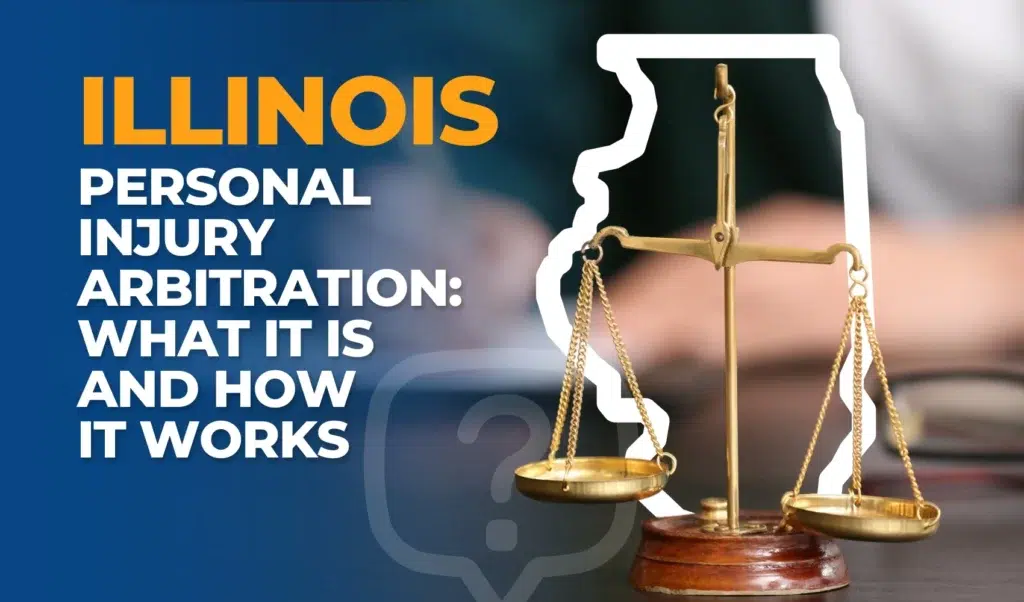When most people think of resolving a personal injury case, they picture a courtroom trial. But in Illinois, many injury disputes are resolved through arbitration—a legal process that can offer a faster and more cost-effective alternative to going before a judge or jury. Arbitration is common in certain types of cases, such as uninsured or underinsured motorist claims, and it can significantly shape the outcome of a claim.
Understanding how arbitration works, when it applies, and what to expect can help injury victims make informed decisions during the legal process. In this article, we’ll explain the basics of personal injury arbitration in Illinois, how it differs from traditional litigation, and the potential advantages and limitations involved.
Court-Annexed Mandatory Arbitration: Filing & Process
- Governing Law
Court-annexed arbitration in Illinois is governed by Illinois Supreme Court Rules 86 through 95, which outline the framework for how arbitration proceedings must be conducted. In addition to these statewide rules, some jurisdictions impose their own procedural requirements. For example, Cook County Rule 25 supplements the Supreme Court rules with local guidelines that must also be followed. - Jurisdictional Thresholds
To qualify for court-annexed arbitration, a case must fall within the monetary limits set by the local circuit court. In most instances, this limit is $50,000, including in Cook, Lake, and DuPage Counties. Arbitration is limited to civil actions seeking monetary damages, making it a common route for lower-value personal injury claims. Cases that exceed the financial threshold or seek equitable relief are not eligible for this process. - Filing
The arbitration process begins the same way as any other civil case: a complaint is filed in either the Law or Municipal Division of the appropriate court. If the case qualifies for arbitration based on the amount in controversy, the clerk will automatically transfer the matter to the court’s arbitration calendar. A mandatory arbitration hearing date is then set, typically scheduled within 180 days of the filing date to ensure a timely resolution. - Assignment of Arbitrators
Arbitration hearings are overseen by neutral third parties who are licensed attorneys with at least five years of legal practice experience. These arbitrators are randomly selected from a court-approved list, as required under Rule 87. Their role is to hear evidence, evaluate arguments from both sides, and render a decision that can be accepted or challenged, depending on the circumstances.
Evidentiary Rules in Arbitration
Illinois Supreme Court Rule 90(c) allows parties to present certain forms of evidence without requiring live testimony. Specifically, written witness statements, medical records, bills, and expert reports may be admitted into evidence if they are served on all parties at least 30 days before the hearing and are accompanied by an affidavit verifying their authenticity. This provision helps streamline the arbitration process and reduce the need for costly and time-consuming in-person testimony.
Under Rule 90(e), the arbitrators are also permitted to consider evidence that would otherwise be inadmissible at trial—but only if both parties explicitly agree to its admission. This flexibility can be useful in reaching a quicker resolution, but it requires mutual consent to relax the usual evidentiary standards.
When it comes to hearsay, Rule 90(c) provides an important exception. Hearsay contained in medical records and billing statements is generally admissible without objection, as long as the procedural requirements—such as timely disclosure and authentication—are satisfied. This rule reflects the practical need to rely on documentation in cases where live testimony may not be feasible.
Although the formal rules of evidence are not strictly enforced in arbitration, proceedings are still governed by principles of fairness and due process. Arbitrators are granted a degree of discretion in evaluating evidence, but their decisions must still be based on competent and credible information, ensuring that the process remains fair to both sides.
Pros and Cons of Mandatory Arbitration
Pros:
- Faster resolution (usually within 6 months of filing).
- Lower cost than full jury trial.
- Flexibility in presenting written evidence (Rule 90(c)).
- Arbitrators are generally experienced and pragmatic.
Cons:
- Non-binding unless both parties accept—could result in duplicated effort.
- No formal discovery rulings or motions practice.
- Arbitrators may apply informal standards or compromise.
- Potential waiver issues if you don’t reject in time.
How to Prepare for Mandatory Arbitration
One of the most important steps in preparing for mandatory arbitration is to timely serve the Rule 90(c) package. This package should include medical records, billing statements, wage loss documentation, and any relevant property damage reports. To avoid the need for live testimony, parties may also include affidavits from treating physicians or eyewitnesses. These documents must be served at least 30 days prior to the hearing and must comply with Rule 90(c) requirements to be considered valid and admissible.
While live testimony is uncommon in arbitration hearings, it’s still important to prepare your client in the event limited cross-examination is necessary. Even brief testimony should be practiced to ensure clarity, accuracy, and confidence under questioning. Being prepared for this possibility helps minimize surprises during the hearing.
Parties should also ensure that all exhibits are properly organized and copied in advance. Bring enough sets for each arbitrator (typically three), the opposing party, and your own file. Well-prepared exhibits help maintain a smooth flow during the hearing and support a clear presentation of your case.
Finally, it’s critical to prepare a succinct statement of the case. This should include a brief narrative or outline summarizing your theory of liability, the injuries and damages claimed, supporting documentation, and any prior settlement offers or demands. A clear, well-structured presentation helps arbitrators quickly understand the core issues and assess the value of the claim.
Rejection and Preservation of Jury Trial Rights
Under Illinois Supreme Court Rule 93, either party has the right to reject the arbitration award within 30 days of the award being filed with the court. This rule ensures that participation in arbitration does not waive a party’s right to a trial, provided the rejection is filed properly and within the designated time frame.
To initiate a rejection, the party must file a “Rejection of Award and Request for Trial” form, which is available through the Clerk’s office. A $200 rejection fee is typically required at the time of filing, although this fee may be waived for indigent litigants. In addition, the rejecting party must have already filed a jury demand or must do so at the time of rejection, along with the appropriate statutory fee, if they wish to preserve the right to a jury trial.
Once a rejection is properly filed, the case proceeds to a jury trial as if the arbitration had never taken place. However, there may be financial consequences if the rejecting party fails to obtain a better result at trial. Under Rule 91(b), the court has discretion to award costs and attorney’s fees against a party who rejects the arbitration award but does not improve their position at trial.
Several important appellate decisions have clarified the scope and application of these rules. In Illinois State Bar Ass’n Mutual Insurance Co. v. Coregis Insurance Co., 355 Ill. App. 3d 156 (1st Dist. 2004), the court held that an arbitration award has no preclusive effect if it is timely rejected. Likewise, in Zelasko v. McLaughlin, 282 Ill. App. 3d 393 (1st Dist. 1996), the court affirmed that a party’s right to trial was preserved, even though the party failed to appear at the arbitration hearing—because the rejection was filed on time. These cases underscore the importance of following procedural rules carefully when seeking to move beyond arbitration.
VI. Strategic Considerations: When to Reject Arbitration
Reject When:
- The award is substantially below your case value;
- The arbitrators misapplied law (e.g., comparative fault, lien priority);
- You have strong live witnesses who didn’t testify in arbitration;
- Opposing party presented questionable evidence not admissible at trial.
Do Not Reject When:
- The award is reasonable or generous;
- Trial risks are high (unpredictable jury, conservative venue);
- Client is vulnerable to cross-examination or surveillance;
- Arbitration result avoids uncertain motions in limine.
Conclusion
Illinois’ court-annexed arbitration system offers a faster, more cost-effective way to resolve many personal injury claims—especially those involving lower monetary amounts. But even within this streamlined process, the outcome can hinge on how well the case is prepared, how evidence is presented, and whether procedural deadlines are met. For someone recovering from an injury, navigating arbitration alone can feel overwhelming.
At Gosuits, we use proprietary technology to simplify each step of the process and keep our clients informed from start to finish. Whether it’s organizing medical documentation, tracking important court timelines, or helping make strategic decisions about arbitration or trial, we’re here to make the legal process more manageable. If you’ve been injured and want to understand your legal options—including whether arbitration might apply to your case—you can schedule a consultation with our team to learn more about how we can help.





